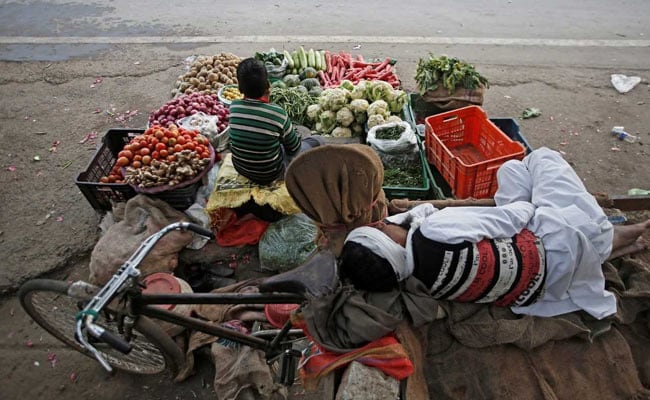
Inflation was higher than 7.40 per cent forecast in a Reuters poll of analysts.
Retail inflation accelerated to 7.59 per cent in January, government data showed on Wednesday, higher than the 7.40 per cent forecast in a Reuters poll of analysts.
Here is what experts said on rising inflation:
Shashank Mendiratta, Economist, IBM, New Delhi
"At 4.16 per cent, core inflation ticked higher from its October trough. However, in our assessment, headline inflation has now peaked and should glide lower starting February as the base turns favourable and vegetable prices respond further to harvest. We would continue to monitor protein prices which can impart upward bias to inflation."
"Nonetheless, despite declining, inflation prints for the next few months are expected to remain above 4.0 per cent, i.e. midpoint of the RBI's inflation target. As such, we expect the central bank to cut rates in the third-quarter meeting"
Rumki Majumdar, Economist, Deloitte India, Bengaluru
"The contraction in December IIP raises concerns about the sustainability of the green shoots in industrial activities that were visible till last month. This does not bode well for the overall economy as global headwinds already pose significant challenges to overall industries.
"The large outbreak of the coronavirus in China can adversely impact India, as China is one of the largest trading partners. With several factories being closed down in China temporarily, the electronics and auto industries in India will likely be hit because of their dependence on Chinese imports of components and raw materials."
Sakshi Gupta, Senior Economist, HDFC Bank, Gurugram
"Today's inflation print was driven by higher food prices, rise in medicine and telecom prices, and an unfavourable base effect. The January print is likely to be the peak as we have been already seeing a drop in onion prices in recent days.
"The base effect will fall off from February onwards. That said I see core inflation numbers remaining above 4 per cent over the coming months due to idiosyncratic factors such as tariff increases. Overall, inflation prints could come in above 6 per cent for the coming two-three months, before moving within the 5-6 per cent range until August.
"The RBI could cut rates at the first opportunity they get - as soon as inflation optics look somewhat favourable (within their target band). They are likely to take comfort from their forward view of inflation falling to 3 per cent by the end of the year. We expect the RBI to deliver a rate cut of 25 bps in the first quarter of the fiscal (April-June 2020)."
Rupa Rege Nitsure, Group Chief Economist, L&T Financial Holdings, Mumbai
"Growth-inflation mix has seriously deteriorated. While industrial production has contracted in line with our in-house expectations, a contraction in consumer goods production underscores the weakness in demand. This clearly means that the festival season uptick was short-lived.
"Headline CPI inflation is very high and contributed by both the food and fuel sectors. Even core inflation has increased to 4.21 per cent by 45 bps. No wonder the RBI tried to provide stimulus thru other measures like CRR exemption and LTROs rather than through a blunt instrument of a repo rate. Today's prints have increased the uncertainty around the RBI's future actions. There will be a longer pause in the rate-cutting cycle now."
Rahul Gupta, Head Of Research- Currency, Emkay Global Financial Services, Mumbai
"The sharp spike in food inflation has led January CPI to breach a six-year high of 7.59 per cent, compared to 7.35 per cent seen in December.
"It is the second consecutive month that CPI has breached the upper band of the RBI's inflation target, while unexpectedly IIP has contracted to 0.3 per cent in December from 1.8 per cent in November. Due to higher inflation, the RBI has been maintaining a status quo since December 2019. If inflation continues to hover above 6 per cent, we don't expect the RBI to cut interest rate or change its accommodative policy stance."
Anagha Deodhar, Economist, ICICI Securities, Mumbai
"Inflation has come in higher than our expectations.
"With January 2020 inflation at 7.6 per cent, the MPC's forecast of 6.5 per cent inflation in the fourth quarter is under threat. Inflation will have to average 6 per cent in February-March to meet this forecast which is highly unlikely.
"Worryingly, food inflation is still in double digits. Core inflation has also jumped to 4.3 per cent, mostly on the back of higher telecom tariffs and personal care costs. Given the sharp increase in headline and core inflation, the MPC is likely to stay put in the near future."










